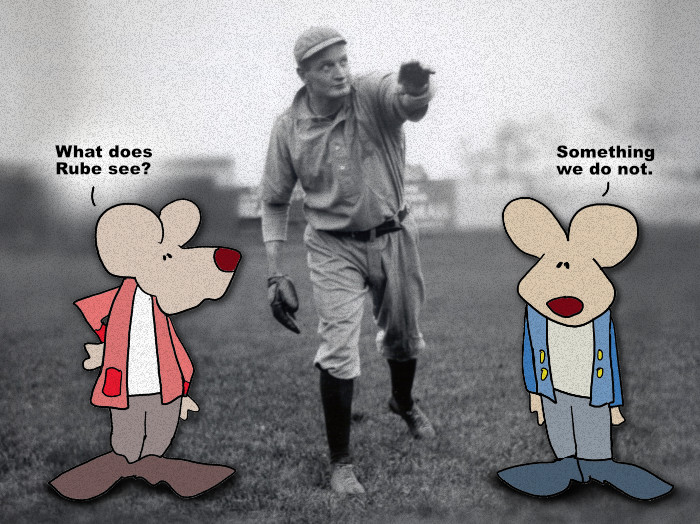What a rube.
We don’t hear this much anymore — people calling other people rubes.
By definition, a rube is an awkward unsophisticated person. They are defined as being a naive or inexperienced person. Webster simply calls a rube a country bumpkin.
But what happens when that is your name?
That was the case with George Edward Waddell (October 13, 1876 – April 1, 1914). He was an American pitcher in Major League Baseball. But everyone knew him as Rube Waddell.
Rube played in the Majors for 13 years. A lefty. He spent time with the Louisville Colonels, Pittsburgh Pirates, and Chicago Orphans in the National League, as well as the Philadelphia Athletics and St. Louis Browns in the American League. Waddell was inducted into the Baseball Hall of Fame in 1946. His pitching was extraordinary, throwing tons of strikeouts during his career.
That sounds about like every other great ball player in history I know. But the thing about Rube was this. No one could ever guess what this guy might do.
Waddell is best remembered for his highly eccentric behavior. For one thing, he would often disappear without notice. Like, right in the middle of a game. Most of the time, it would be that he went off somewhere to fish or hunt. The notion would just hit him. Other times, he would disappear and go off drinking. But the people around him never knew.
Some of the stories aren’t that big of a deal, I don’t think. Like. Rube used to like to eat animal crackers in bed. Not cookies. Not saltines. Animal crackers. I guess he did it often and was messy about it, leaving crumbs all over the sheet. For some reason, his personal catcher was really put off by this and asked their manager, Connie Mack, to make Rube stop. I’m not sure if they had to share a bed on the road or what. But the animal crackers had to go.
Whenever Rube pitched, though, he would easily get distracted. Fans and managers from opposing teams would bring puppies to the games because Rube would want to go play with the puppies instead of pitching.
There were times when he’d be on the mound and hear a fire truck go by. Rube would strip down and run off to help the firemen. But he didn’t just stand around once he was there. He helped to save many lives when he did this. As such, he was regarded as a hero.
Also, he must have had a thing for animals. Somewhere along the line, he wrestled an alligator, was bitten by a lion, and rode an emu.
If a parade were going by, he’d jump in to randomly lead the marching band.
There is one story about a bartender who wanted to leave work and go watch the “great Rube Waddell” pitch. Waddell offered to take over the bar so the bartender could go watch the game. Of course, the bartender went to the game, and there was no Rube Waddell on the mound. When he returned to the bar, he found out who Waddell really was, standing there, serving drinks.
On another occasion, one of his team’s staffers had to go look for Rube before a game. When the staffer found him, Rube was across town trying to sell hot dogs for some street vendor. Rube wouldn’t leave the food stand until the hot dogs were all gone. So, the staffer bought all the hot dogs so he could get Rube back to the stadium to pitch.
After 1910, his erratic behavior caught up to him. He got sent down to the lower-level leagues for a few seasons but floundered there.
A few years later, in 1913, the Great Flood hit the Midwest, including Ohio and Kentucky. Rube went off to help the community in Hickman, Kentucky, but in doing so, he caught pneumonia. His illness cost him the rest of his playing days. A short time later, he died of Tuberculosis.
I like Rube. He seemed like a guy who was wholly interested in what was happening right before him in any given moment. It may not have been what he was “supposed” to be doing by society’s standards. But it was the thing he was “supposed” to be doing by his own estimations.
=====
“Forever is composed of nows.”
― Emily Dickinson
=====
“Write it on your heart that every day is the best day in the year.”
― Ralph Waldo Emerson
=====
“Happiness, not in another place but this place…not for another hour, but this hour.”
― Walt Whitman
======
What a rube. In a perfect way.
